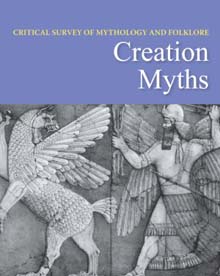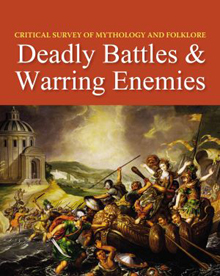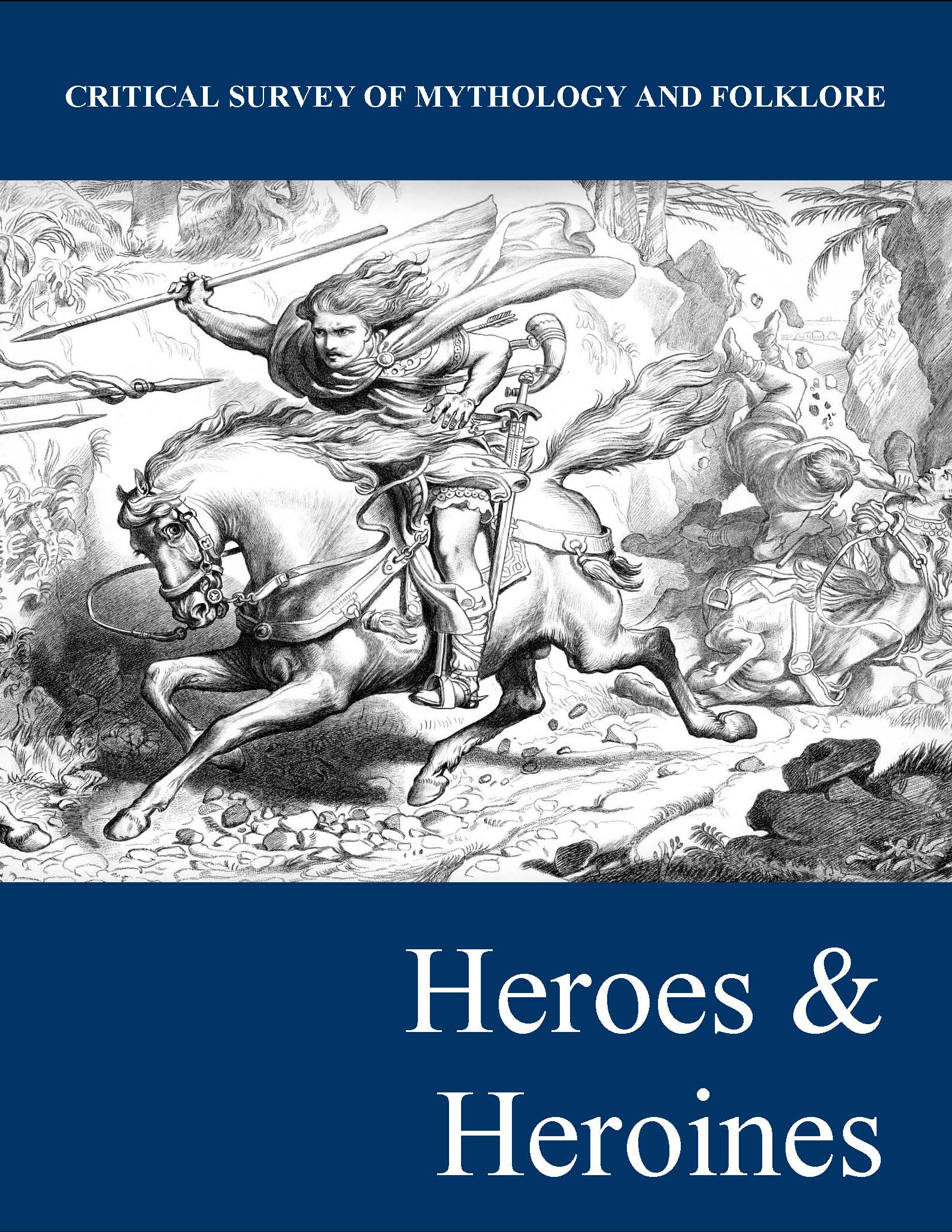
Go to OneSearch to search for more print books.
Want more on finding print books? Try our How to Use OneSearch guide.
-
-
 Myth: A Very Short Introduction
Where do myths come from? What is their function and what do they mean?In this Very Short Introduction Robert Segal introduces the array of approaches used to understand the study of myth. These approaches hail from disciplines as varied as anthropology, sociology, psychology, literary criticism, philosophy, science, and religious studies. Including ideas fromtheorists as varied as Sigmund Freud, Claude Levi-Strauss, Albert Camus, and Roland Barthes, Segal uses the famous ancient myth of Adonis to analyse their individual approaches and theories.In this new edition, he not only considers the future study of myth, but also considers the interactions of myth theory with cognitive science, the implications of the myth of Gaia, and the differences between story-telling and myth.ABOUT THE SERIES: The Very Short Introductions series from Oxford University Press contains hundreds of titles in almost every subject area. These pocket-sized books are the perfect way to get ahead in a new subject quickly. Our expert authors combine facts, analysis, perspective, new ideas, andenthusiasm to make interesting and challenging topics highly readable.
Myth: A Very Short Introduction
Where do myths come from? What is their function and what do they mean?In this Very Short Introduction Robert Segal introduces the array of approaches used to understand the study of myth. These approaches hail from disciplines as varied as anthropology, sociology, psychology, literary criticism, philosophy, science, and religious studies. Including ideas fromtheorists as varied as Sigmund Freud, Claude Levi-Strauss, Albert Camus, and Roland Barthes, Segal uses the famous ancient myth of Adonis to analyse their individual approaches and theories.In this new edition, he not only considers the future study of myth, but also considers the interactions of myth theory with cognitive science, the implications of the myth of Gaia, and the differences between story-telling and myth.ABOUT THE SERIES: The Very Short Introductions series from Oxford University Press contains hundreds of titles in almost every subject area. These pocket-sized books are the perfect way to get ahead in a new subject quickly. Our expert authors combine facts, analysis, perspective, new ideas, andenthusiasm to make interesting and challenging topics highly readable.
-
 Mythology
The world-renowned classic that has enthralled and delighted millions of readers with its timeless tales of gods and heroes. Edith Hamilton's mythology succeeds like no other book in bringing to life for the modern reader the Greek, Roman and Norse myths that are the keystone of Western culture-the stories of gods and heroes that have inspired human creativity from antiquity to the present. We follow the drama of the Trojan War and the wanderings of Odysseus. We hear the tales of Jason and the Golden Fleece, Cupid and Psyche, and mighty King Midas. We discover the origins of the names of the constellations. And we recognize reference points for countless works for art, literature and culture inquiry-from Freud's Oedipus complex to Wagner's Ring Cycle of operas to Eugene O'Neill's Mourning Becomes Electra Both a reference text for scholars of all ages and a book to simply enjoy, Mythology is a classic not to be missed.
Mythology
The world-renowned classic that has enthralled and delighted millions of readers with its timeless tales of gods and heroes. Edith Hamilton's mythology succeeds like no other book in bringing to life for the modern reader the Greek, Roman and Norse myths that are the keystone of Western culture-the stories of gods and heroes that have inspired human creativity from antiquity to the present. We follow the drama of the Trojan War and the wanderings of Odysseus. We hear the tales of Jason and the Golden Fleece, Cupid and Psyche, and mighty King Midas. We discover the origins of the names of the constellations. And we recognize reference points for countless works for art, literature and culture inquiry-from Freud's Oedipus complex to Wagner's Ring Cycle of operas to Eugene O'Neill's Mourning Becomes Electra Both a reference text for scholars of all ages and a book to simply enjoy, Mythology is a classic not to be missed.
-
 A Short History of Myth
This brilliant, readable synthesis of the history of mythology and the function it serves to humanity is the launch title of the groundbreaking publishing event, The Myths . "Human beings have always been mythmakers." So begins Karen Armstrong's concise yet compelling investigation into myth: what it is, how it has evolved, and why we still so desperately need it. She takes us from the Paleolithic period and the myths of the hunters right up to the "Great Western Transformation" of the last five hundred years and the discrediting of myth by science. The history of myth is the history of humanity, our stories and beliefs, our curiosity and attempts to understand the world, which link us to our ancestors and each other. Myths help us make sense of the universe. Heralding a major series of retellings of international myths by authors from around the world, Armstrong's characteristically insightful and eloquent book serves as a brilliant and thought-provoking introduction to myth in the broadest sense -- and explains why if we dismiss it, we do so at our peril.
A Short History of Myth
This brilliant, readable synthesis of the history of mythology and the function it serves to humanity is the launch title of the groundbreaking publishing event, The Myths . "Human beings have always been mythmakers." So begins Karen Armstrong's concise yet compelling investigation into myth: what it is, how it has evolved, and why we still so desperately need it. She takes us from the Paleolithic period and the myths of the hunters right up to the "Great Western Transformation" of the last five hundred years and the discrediting of myth by science. The history of myth is the history of humanity, our stories and beliefs, our curiosity and attempts to understand the world, which link us to our ancestors and each other. Myths help us make sense of the universe. Heralding a major series of retellings of international myths by authors from around the world, Armstrong's characteristically insightful and eloquent book serves as a brilliant and thought-provoking introduction to myth in the broadest sense -- and explains why if we dismiss it, we do so at our peril.
-
 Women Who Run with the Wolves: Myths and Stories of the Wild Woman Archetype
NEW YORK TIMES BESTSELLER * More than 2.7 million copies sold! * "A deeply spiritual book [that] honors what is tough, smart and untamed in women."--The Washington Post Book World Book club pick for Emma Watson's Our Shared Shelf Within every woman there lives a powerful force, filled with good instincts, passionate creativity, and ageless knowing. She is the Wild Woman, who represents the instinctual nature of women. But she is an endangered species. For though the gifts of wildish nature belong to us at birth, society's attempt to "civilize" us into rigid roles has muffled the deep, life-giving messages of our own souls. In Women Who Run with the Wolves, Dr. Clarissa Pinkola Estés unfolds rich intercultural myths, fairy tales, folk tales, and stories, many from her own traditions, in order to help women reconnect with the fierce, healthy, visionary attributes of this instinctual nature. Through the stories and commentaries in this remarkable book, we retrieve, examine, love, and understand the Wild Woman, and hold her against our deep psyches as one who is both magic and medicine. Dr. Estés has created a new lexicon for describing the female psyche. Fertile and life-giving, it is a psychology of women in the truest sense, a knowing of the soul.
Women Who Run with the Wolves: Myths and Stories of the Wild Woman Archetype
NEW YORK TIMES BESTSELLER * More than 2.7 million copies sold! * "A deeply spiritual book [that] honors what is tough, smart and untamed in women."--The Washington Post Book World Book club pick for Emma Watson's Our Shared Shelf Within every woman there lives a powerful force, filled with good instincts, passionate creativity, and ageless knowing. She is the Wild Woman, who represents the instinctual nature of women. But she is an endangered species. For though the gifts of wildish nature belong to us at birth, society's attempt to "civilize" us into rigid roles has muffled the deep, life-giving messages of our own souls. In Women Who Run with the Wolves, Dr. Clarissa Pinkola Estés unfolds rich intercultural myths, fairy tales, folk tales, and stories, many from her own traditions, in order to help women reconnect with the fierce, healthy, visionary attributes of this instinctual nature. Through the stories and commentaries in this remarkable book, we retrieve, examine, love, and understand the Wild Woman, and hold her against our deep psyches as one who is both magic and medicine. Dr. Estés has created a new lexicon for describing the female psyche. Fertile and life-giving, it is a psychology of women in the truest sense, a knowing of the soul.
-
 The World of Lore: Monstrous Creatures
A fascinating, beautifully illustrated guide to the monsters that are part of our collective psyche, featuring stories from the Lore podcast--now a streaming television series--including "They Made a Tonic," "Passed Notes," and "Unboxed," as well as rare material. They live in shadows--deep in the forest, late in the night, in the dark recesses of our minds. They're spoken of in stories and superstitions, relics of an unenlightened age, old wives' tales, passed down through generations. Yet no matter how wary and jaded we have become, as individuals or as a society, a part of us remains vulnerable to them: werewolves and wendigos, poltergeists and vampires, angry elves and vengeful spirits. In this beautifully illustrated volume, the host of the hit podcast Lore serves as a guide on a fascinating journey through the history of these terrifying creatures, exploring not only the legends but what they tell us about ourselves. Aaron Mahnke invites us to the desolate Pine Barrens of New Jersey, where the notorious winged, red-eyed Jersey Devil dwells. He delves into harrowing accounts of cannibalism--some officially documented, others the stuff of speculation . . . perhaps. He visits the dimly lit rooms where séances take place, the European villages where gremlins make mischief, even Key West, Florida, home of a haunted doll named Robert. In a world of "emotional vampires" and "zombie malls," the monsters of folklore have become both a part of our language and a part of our collective psyche. Whether these beasts and bogeymen are real or just a reflection of our primal fears, we know, on some level, that not every mystery has been explained and that the unknown still holds the power to strike fear deep in our hearts and souls. As Aaron Mahnke reminds us, sometimes the truth is even scarier than the lore. The World of Lore series includes: MONSTROUS CREATURES * WICKED MORTALS * DREADFUL PLACES
The World of Lore: Monstrous Creatures
A fascinating, beautifully illustrated guide to the monsters that are part of our collective psyche, featuring stories from the Lore podcast--now a streaming television series--including "They Made a Tonic," "Passed Notes," and "Unboxed," as well as rare material. They live in shadows--deep in the forest, late in the night, in the dark recesses of our minds. They're spoken of in stories and superstitions, relics of an unenlightened age, old wives' tales, passed down through generations. Yet no matter how wary and jaded we have become, as individuals or as a society, a part of us remains vulnerable to them: werewolves and wendigos, poltergeists and vampires, angry elves and vengeful spirits. In this beautifully illustrated volume, the host of the hit podcast Lore serves as a guide on a fascinating journey through the history of these terrifying creatures, exploring not only the legends but what they tell us about ourselves. Aaron Mahnke invites us to the desolate Pine Barrens of New Jersey, where the notorious winged, red-eyed Jersey Devil dwells. He delves into harrowing accounts of cannibalism--some officially documented, others the stuff of speculation . . . perhaps. He visits the dimly lit rooms where séances take place, the European villages where gremlins make mischief, even Key West, Florida, home of a haunted doll named Robert. In a world of "emotional vampires" and "zombie malls," the monsters of folklore have become both a part of our language and a part of our collective psyche. Whether these beasts and bogeymen are real or just a reflection of our primal fears, we know, on some level, that not every mystery has been explained and that the unknown still holds the power to strike fear deep in our hearts and souls. As Aaron Mahnke reminds us, sometimes the truth is even scarier than the lore. The World of Lore series includes: MONSTROUS CREATURES * WICKED MORTALS * DREADFUL PLACES
-
 The World of Myth
Since its publication in 1991, The World of Myth has provided thousands of students with a fascinating, wide-ranging introduction to world mythology. Building on the bestselling tradition of the first edition, the long-awaited second edition offers a uniquely comprehensive collection of mythsfrom numerous cultures around the globe. Featuring a thematic organization, it helps students understand world mythology as a metaphor for humanity's search for meaning in a complex world.Author David Leeming presents a sweeping variety of myths whose origins range from ancient Egypt and Greece to the Polynesian islands and modern science. Students will be captivated by stories of great floods from the ancient Babylonians, Hebrews, Chinese, and Mayans; tales of apocalypse from India,the Norse, Christianity, and modern science; myths of the mother goddess from Native American Hopi culture and James Lovelock's Gaia; and much more. One of the most wide-ranging anthologies available, this volume includes myths from African, Australian Aboriginal, Aztec, Celtic, Chinese, Greek,Hittite, Japanese, Muslim, and Persian cultures.
The World of Myth
Since its publication in 1991, The World of Myth has provided thousands of students with a fascinating, wide-ranging introduction to world mythology. Building on the bestselling tradition of the first edition, the long-awaited second edition offers a uniquely comprehensive collection of mythsfrom numerous cultures around the globe. Featuring a thematic organization, it helps students understand world mythology as a metaphor for humanity's search for meaning in a complex world.Author David Leeming presents a sweeping variety of myths whose origins range from ancient Egypt and Greece to the Polynesian islands and modern science. Students will be captivated by stories of great floods from the ancient Babylonians, Hebrews, Chinese, and Mayans; tales of apocalypse from India,the Norse, Christianity, and modern science; myths of the mother goddess from Native American Hopi culture and James Lovelock's Gaia; and much more. One of the most wide-ranging anthologies available, this volume includes myths from African, Australian Aboriginal, Aztec, Celtic, Chinese, Greek,Hittite, Japanese, Muslim, and Persian cultures.
 Go to A-Z Databases: Books & eBooks to search for more eBooks. Must be on campus or login with your COM account for off campus access.
Go to A-Z Databases: Books & eBooks to search for more eBooks. Must be on campus or login with your COM account for off campus access. Critical Survey of Mythology & Folklore: Creation Myths
Critical Survey of Mythology & Folklore: Creation Myths
 Critical Survey of Mythology and Folklore: Deadly Battles & Warring Enemies
Critical Survey of Mythology and Folklore: Deadly Battles & Warring Enemies
 Critical Survey of Mythology and Folklore: Heroes & Heroines
The Critical Survey of Mythology and Folklore presents articles on myths, folktales, legends, and other traditional literature. The second title in the series is Heroes and Heroines. Drawing upon the most widely-read literature, as well as introducing to readers overlooked yet significant tales, the theme of the hero and heroine is one of the most universal stories told across cultures. This volume covers a diverse range of countries and cultures, as well as important retellings in the modern tradition. Articles begin with a contextual overview of the important cultural and social currents surrounding the myth and the life of the author. A summary offers readers the major actions and characters in a myth followed by an in-depth analysis drawing upon scholarship in the field.
Critical Survey of Mythology and Folklore: Heroes & Heroines
The Critical Survey of Mythology and Folklore presents articles on myths, folktales, legends, and other traditional literature. The second title in the series is Heroes and Heroines. Drawing upon the most widely-read literature, as well as introducing to readers overlooked yet significant tales, the theme of the hero and heroine is one of the most universal stories told across cultures. This volume covers a diverse range of countries and cultures, as well as important retellings in the modern tradition. Articles begin with a contextual overview of the important cultural and social currents surrounding the myth and the life of the author. A summary offers readers the major actions and characters in a myth followed by an in-depth analysis drawing upon scholarship in the field.
![]()